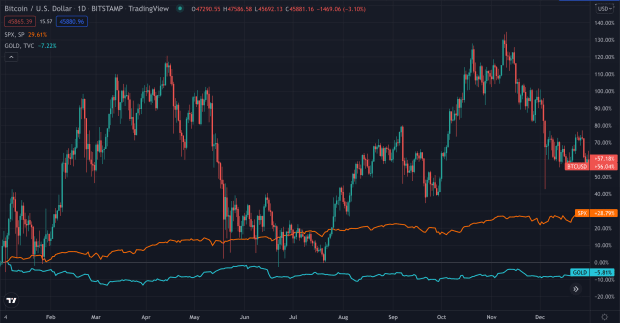Jeremy Siegel said in an interview that Bitcoin is acting as a better inflation hedge than gold.
- Bitcoin is providing better protection from inflation than gold, a Wharton finance professor said.
- Jeremy Siegel added that Bitcoin has replaced gold in the minds of younger investors.
- The peer-to-peer money outperformed gold by a large margin last year, rising by almost 60% while the metal lost 5% of its value.
Bitcoin is acting as a better inflation hedge than gold and has replaced the metal in the minds of younger investors, a senior Wharton professor said in a Friday interview with CNBC.
“Let’s face the fact, I think Bitcoin as an inflation hedge in the minds of many of the younger investors has replaced gold,” Jeremy Siegel said. “I think that the story of gold is a fact that the young generation is regarding Bitcoin as the substitute.”
The professor added that gold’s performance in 2021 has been “disappointing,” in fact the metal’s worst year since 2015. Gold lost 5.81% of its value during 2021, while Bitcoin gained nearly 60%. The S&P 500, in comparison, rose by about 30%.

Investors were outspoken about gold and Bitcoin in 2021, with many hinting at the ways the digital monetary system is superior to the old metal. Billionaire Howard Marks, the chairman of Oaktree Capital, said in September that Bitcoin had advantages relative to gold, adding that its 21 million supply limit enables the peer-to-peer currency to continue appreciating as demand grows. In October, JP Morgan analysts said in a note that “institutional investors appear to be returning to bitcoin perhaps seeing it as a better inflation hedge than gold.” According to the bank, money was flowing out of gold and into Bitcoin, fueling the inflation hedge narrative and the substitution of gold as the go-to asset for such a purpose.
U.S. consumer prices soared in 2021 to levels not seen for decades as the CPI, the main index used to measure inflation in the country, reached 6.8% in November, the highest rate since 1982, marking the ninth consecutive month above the Fed’s 2% target inflation rate. In response, the central bank announced further tightening of its monetary policies in 2022, seeking to end its asset purchasing programs before the summer.




